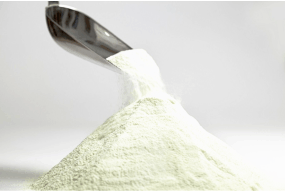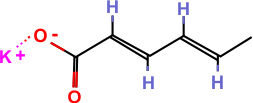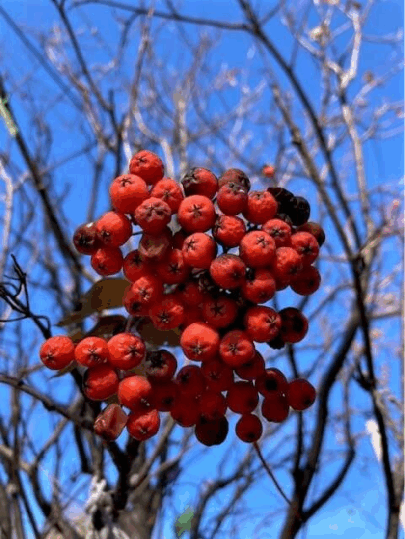What is Potassium Sorbate?
Potassium Sorbate is a natural preservative we use in our bug spray to keep it fresh and potent. It comes from berries and stops mold and fungi from growing, making sure our product lasts longer and stays effective. Plus, it’s safe for people and the environment!
Potassium Sorbate is a food Additive!
The U.S. Food and Drug Administration (FDA) recognizes Potassium Sorbate as a safe and effective preservative when used in accordance with approved levels and practices. (please see 21 CFR 172.822).
Why use Potassium Sorbate in Repellents?
Potassium Sorbate is a useful ingredient in natural bug repellents because it inhibits the growth of fungi and mold, is effective against a wide range of pests, is safe for human use, and is environmentally friendly. When combined with other natural ingredients that have insect-repelling properties, Potassium Sorbate can help to create effective and eco-friendly pest control solutions.
Minimum Risk Pesticide
Potassium Sorbate is an allowed active ingredient in Minimum Risk Pesticides exempted under FIFRA section 25(b) and it is included in our natural bug spray as an effective preservative that prevents the growth of bacteria and fungi, ensuring the safety and quality of our product.
What are some Industrial Uses for Potassium Sorbate?

Potassium Sorbate Powder

The Molecular Stucture of Potassium Sorbate
Potassium Sorbate
in Food Products- In Food Products:
- Baked goods (bread, cakes, cookies, etc.)
- Dairy products (cheese, yogurt, sour cream, etc.)
- Meats (sausages, deli meats, etc.)
- Fruits and vegetables (fresh and canned)
- Fruit juices and soft drinks
- Wine and beer
- Salad dressings
- Snack foods (chips, crackers, etc.)
- Jams and jellies
- Syrups and toppings
- Pickles and other pickled products
- Sauces and gravies
- Confections (chocolate, candy, etc.)
- Some dietary supplements and vitamin preparations.
Potassium Sorbate
in Personal Care Products- In Personal Care Products:
- Shampoos and conditioners
- Body washes and soaps
- Facial cleansers and toners
- Moisturizers and lotions
- Deodorants and antiperspirants
- Toothpaste and mouthwash
- Sunscreen and sunblock
- Cosmetics (mascara, lipstick, foundation, etc.)
- Hair styling products (gel, mousse, hairspray, etc.)
- Baby wipes and other baby care products
- Feminine hygiene products (pads, tampons, etc.)
- Shaving creams and gels
- Contact lens solutions.
How many items in you home contain Potassium Sorbate?
What are the Benefits of Potassium Sorbate in Personal Care Products like Shampoos and Toothpaste?
Preservation: Potassium sorbate helps to extend the shelf life of personal care products by inhibiting the growth of bacteria, yeast, and molds. This can help to prevent spoilage and maintain the product’s quality over time.
Safety: Potassium sorbate is generally recognized as safe by regulatory agencies such as the FDA and has a long history of use in food and personal care products. It is considered to be a mild preservative that is less likely to cause skin irritation or sensitization.
Stability: Potassium sorbate is stable in a wide range of pH levels and temperatures, making it a versatile preservative that can be used in a variety of personal care formulations.
Cost-effectiveness: Potassium sorbate is relatively inexpensive compared to other preservatives, making it an attractive option for manufacturers looking to reduce costs while still maintaining product quality and safety.
What are the Benefits of Potassium Sorbate in Cleaning Products like Surface Cleaners?
Inhibiting Microbial Growth: Potassium sorbate can prevent the growth of yeast, molds, and bacteria in food products, which can help extend their shelf life and maintain their quality.
Safety: Potassium sorbate is considered to be a safe food preservative and is generally recognized as safe (GRAS) by the US Food and Drug Administration (FDA). It has been extensively studied and has a long history of use in the food industry.
Stability: Potassium sorbate is stable in a wide range of pH levels, making it a versatile preservative that can be used in a variety of food products.
Taste and Appearance: Potassium sorbate is a relatively neutral preservative that does not significantly affect the taste, color, or texture of food products. This makes it a popular choice for preserving a wide range of food products.
Cost-Effectiveness: Potassium sorbate is relatively inexpensive compared to other preservatives, making it a cost-effective option for food manufacturers looking to extend the shelf life of their products.
What amazing Chemist found Sodium Lauryl Sulphate?
Walter Prescher discovered potassium sorbate while he was studying the chemical properties of berries in 1859. While investigating the chemical composition of berries, he found that some berries had a natural ability to resist spoilage. Prescher believed that there was a chemical compound responsible for this ability, and he began experimenting with various chemicals to identify it.
Eventually, Prescher discovered a natural compound in the berries that was later identified as potassium sorbate. He found that this compound was effective at inhibiting the growth of molds, yeasts, and bacteria, and he realized that it could be used as a preservative in a variety of products. Prescher’s discovery of potassium sorbate was a significant breakthrough in the field of food and beverage preservation, and it paved the way for the use of this versatile compound in many other applications, including personal care products and insect repellents.

Petition to include Sodium Lauryl Sulphate as an Organic Pesticide. Read more
"Everything You Should Know About Potassium Sorbate"
healthline

References:
Nazeri, V., & Kavoosi, G. (2020). Potassium sorbate: a review on applications in food and biological systems. Journal of Food Science and Technology, 57(3), 679-687.
Rodríguez, A., Rodríguez, M., & Andrade, M. J. (2018). Effect of potassium sorbate on the sensory properties and microbial stability of non-alcoholic pomegranate cider. Food and Bioproducts Processing, 111, 80-85.
Sahan, Y., & Yasar, A. (2019). The use of potassium sorbate as a food preservative and its effect on human health. Journal of Food Processing and Preservation, 43(4), e13924.
Burt, S. (2004). Essential oils: their antibacterial properties and potential applications in foods—a review. International Journal of Food Microbiology, 94(3), 223-253.
Rajkowska, K., & Kunicka-Styczyńska, A. (2015). Application of natural preservatives for food preservation. Environmental Protection and Natural Resources, 26(3), 69-79.
